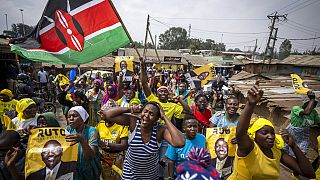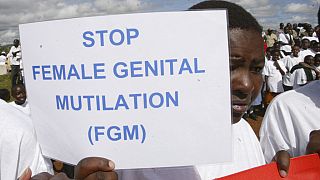Gambia
As health officials across Africa urge women to get COVID-19 vaccines, they’ve confronted hesitancy among those of childbearing age.
In Gambia, many women begin their day at dawn by starting a fire to cook breakfast.
Lucy Jarju, a seasonal oyster harvester, makes her way with others to the river after morning chores.
They spend hours paddling small boats in the waters of the Gambia River estuary in search of oysters, crabs or small fish caught in the mangrove.
What is left uneaten will be sold, making up the bulk of their household income.
Jarju, 53, isn't willing to be vaccinated against COVID-19 if it means missing even a day's work.
Her husband died a decade ago, leaving her alone to provide for her seven children and three grandchildren.
"If you hear the way people talk about it, you would be very scared," she said seated in the door of her house in Serrekunda city, near the capital, Banjul.
"If I take the vaccine and I can't move again, what will I do? I have no one to help me, that's why I'm scared," she told The Associated Press.
She often doesn't make it home until dark, washing dishes before finally heading to bed, ready to repeat her routine the next day.
Jarju said she's had other vaccines, but has yet to make the 25-minute trek on foot to the nearest clinic for her COVID-19 shot.
Her friend Oumie Sambou's much older husband can no longer work and she still has five children to feed.
Sambou also depends on the river to bring in food.
For those women, whose days are dictated by the tide, their success is measured in youngsters fed that night.
Sambou says she is hesitant about the vaccine and argues that others have taken it and have felt tired.
"I'm not convinced to accept the vaccine," she said while waiting for the crabs she caught that day to cook.
Other women say they're simply more afraid of the vaccine than the virus, after listening to controversial information, rumors and false news circulating on social media and among their friends.
As breadwinners, they can't miss a day of work if side effects such as fatigue and fever briefly sideline them.
Delays in getting vaccines to impoverished countries allowed misinformation to flourish, even in outlying villages where few people own smartphones.
And with female literacy a challenge across Africa, women have long relied on word of mouth for information.
The spread of vaccine misinformation is in large part to blame for the gender gap, officials say.
Only about half of the world's 200 countries and regions have reported COVID-19 vaccine data by gender, according to a global tracker at University College London.
But since similar scenes play out across this country of 2.2 million people and its neighboring nations, experts fear the worst for women in those places.
In the Gambia, like many African countries, AstraZeneca was the only vaccine available initially.
Widespread publicity of the links between that shot and rare blood clots in women during a fumbled rollout in Europe set back vaccination efforts.
Many Gambians believed the shot would stop their blood from flowing altogether, thanks to poor translation of news into local languages.
Officials also confronted a deep mistrust of government and a belief that Africans were getting shots no one else wanted.
Rumors also swirled that the vaccine was designed to control the continent's birth rate.
Health officials have made strides getting Gambian women vaccinated; they now make up about 53 percent of those who've had the jabs, up to several percentage points from just a few months ago.
But there's been a lag among those of child-bearing age, despite how frequently they're in contact with maternity clinic workers.
Despite the rampant concerns about pregnancy and fertility, there is no evidence that vaccines affect a woman's chances of getting pregnant.
The US Centers for Disease Control and Prevention tracked tens of thousands of immunized women and found no difference in their pregnancy outcomes.
On a recent morning in Bundung Maternal and Child Health Hospital on the outskirts of Gambia's capital, chief executive officer Kebba Manneh asked a group of dozens of expectant mothers how many had been vaccinated against COVID-19.
Just one raised her hand.
Footsteps away, other women brought in their babies and toddlers for routine immunizations - measles, diphtheria and tetanus.
"You take your child to get vaccinations," Manneh said, trying to encourage them to get the jab. "Have you ever asked?"
Eight months pregnant Oumie Nyassi, pulled out her phone to show him a video with false information circulating on the internet, showing a woman claiming that her arm was magnetized - with a spoon stuck to the arm - after receiving the vaccine against COVID-19.
"We were almost the last to get the vaccines so, before the vaccine came, the misinformation reached us and it was really very difficult to get people on board," Manneh said.
Fatoumata Nyabally's job as a security officer puts her at heightened risk of contracting COVID-19, and she hasn't been vaccinated.
She's seven months pregnant with her fourth child. Her husband did not attend Manneh's presentation.
He's already refused to consent for his wife's vaccination.
Of the 100 women approached that day at the hospital, only nine agreed to receive the jab.
As health officials in the Gambia and across Africa continue urging women to be vaccinated, many women worry that current or future pregnancies will be threatened, and in the continent, the success of a woman's marriage often depends on the number of children she bears.
In Sare Gibel, about 300 kilometres (186 miles) from Banjul, health workers drive past with a megaphone and distribute T-shirts emblazoned with a slogan in support of the vaccine.
But the women in the village of about 500 residents have already heard the rumours on social media.
Lama Mballow has never made the trip to town for her vaccine. And her resolve - and that of the other women in the village - has not softened.
They share much - meal preparation duties, child care, trips to the well with plastic jugs - as well and their outlook on the vaccine.
"What makes me scared of going and taking the vaccine is that I heard a lot about it, also I watched it on the phone (someone) saying that the vaccine is not good. If you take the vaccine, you will not have a child, if you get the injection you will not be able to walk," said Mballow, who has a 4-year-old son and another child on the way.
Although data on the gender breakdown of vaccine distribution are lacking globally, experts see a growing number of women in Africa's poorest countries consistently missing out on vaccines.
Officials who already bemoan the inequity of vaccine distribution between rich and poor nations now fear that the stark gender disparity means African women are the least vaccinated population in the world.











01:02
WHO member countries draft landmark preparedness treaty for next pandemic
Go to video
Mauritius: Ex-finance minister released on bail after corruption charges
00:52
Burkina Faso denounces fake massacre videos
02:09
Electric tricycles empower women in rural Zimbabwe
05:00
Fatoumata Maiga: A woman leading Mali’s fight for peace
04:46
Young Senegalese women market agribusiness on YouTube